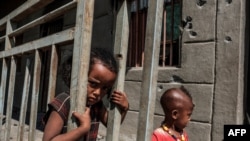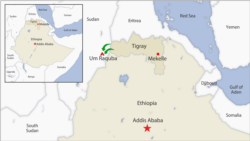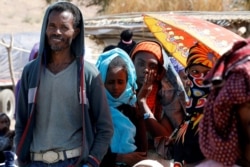Reports this week of a senior Ethiopian military official’s comments that security forces from neighboring Eritrea entered the fray in the northern Tigray region backed what U.S. officials and outside observers have been saying for weeks based on satellite evidence.
“The truth of the matter is that many of us knew from day one the involvement of Eritrea. And the involvement of Eritrea was not a unilateral involvement,” said Awet Weldemichael, a professor of history and global development studies at Queen’s University in Kingston, Ontario, Canada.
“This looks systematic,” Awet told VOA, contradicting the Ethiopian government’s stance that Eritrean troops entered the region without an invitation. “The federal government in Addis Ababa seems to be trying to find ways to ease the pressure on itself. None of this massive involvement can happen without proper planning, coordination. And that happens with an open invitation — not only the invitation, but active collaboration staged by the prime minister of Ethiopia and the president of Eritrea, then carried out by their respective senior-most generals.”
Since the conflict in northern Ethiopia began in November, the federal government and the Eritrean government have denied that Eritrean troops were operating on Ethiopian soil.
‘This is our country’
Major General Belay Seyoum, the leader of the Northern Command of Ethiopia’s National Defense Force, contradicted that stance during a town hall meeting in the Tigray region’s capital, Mekelle, in December. His comments and a video of him speaking at the town hall surfaced earlier on social media and then were published Wednesday in the Addis Standard, a weekly independent magazine, and picked up by international wire services.
“The main mission of the defense force is to protect the sovereignty of the country,” Seyoum said. But he said it is important to understand who crossed the border and killed the troops protecting that border. “A foreign army that is unwanted entered,” he said.
“This is our country,” he said in the video. “My conscience doesn’t allow me to ask for the Eritrean army’s help. This is our internal problem, and we can solve it ourselves. And we don’t have a capacity problem.”
The new Mekelle city mayor with the Tigray Provisional Administration, Ataklti Hailesilassie, also referenced the presence of Eritrean troops.
“We were told word for word that they were working to withdraw them in a short period of time,” he told residents, speaking in Tigrigna. He later said he was repeating what the general said about Eritrean troops when asked to clarify if the discussion was about the Amhara militia or other military personnel who entered the Tigray region during what Prime Minister Abiy Ahmed termed a law enforcement operation.
Accusations of attacks on refugees
Amid the conflict, Eritrean armed forces have been accused by international observers of attacking and abducting Eritrean refugees who live in Tigray. About 96,000 Eritrean refugees live in the region after fleeing their home country.
U.S. Senators Cory Booker of New Jersey and Todd Young of Indiana demanded an end to this activity in a joint statement.
“We are deeply concerned by reports of Eritrean refugees in Tigray being killed, abducted and forcibly returned to Eritrea by Eritrean forces, as well as disturbing reports that some trying to reach safer areas are being prevented from leaving,” the statement said.
Early reports of Eritrean troops on the ground included those from diplomats who cited satellite evidence, intercepted communications and anecdotal reports. Later, a U.S. State Department spokesperson who was asked to verify claims said, “We are aware of credible reports of Eritrean military involvement in Tigray and view this as a grave development.
“We urge that any such troops be withdrawn immediately. We are also aware of reports of human rights violations and abuses in the region. All parties must respect human rights and international humanitarian law.
“We and other international partners continue to urge an independent investigation of the reports and accountability for those found responsible,” the spokesman told VOA in an email response. “We continue to urge all parties to restore peace, protect civilians — including refugees — and allow unhindered humanitarian access in Tigray.”
Awet told VOA the cooperation between Eritrean and Ethiopian forces took several forms.
Ethiopia flew soldiers and materiel to Eritrean airfields and then reentered the country by crossing Ethiopia’s northern border, he said. Early in the conflict, Ethiopian soldiers fled to Eritrea, where they were allowed to reassemble and return to the conflict to launch counterattacks, according to Awet.
Eritrea also offered intelligence and heavy artillery support to Ethiopian forces attacking the TPLF from the north, he said.







